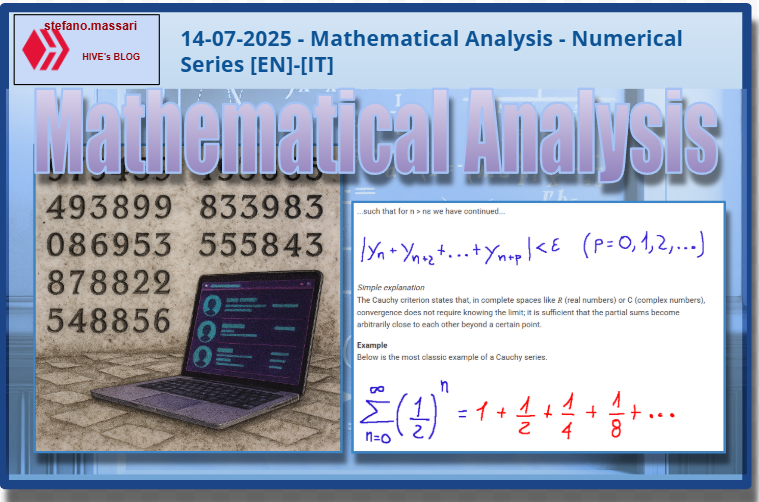
~~~ La versione in italiano inizia subito dopo la versione in inglese ~~~
ENGLISH

14-07-2025 - Mathematical Analysis - Numerical Series [EN]-[IT]
With this post, I would like to provide a brief introduction to the topic mentioned above.
(code notes: X-57-56)
Numerical Series
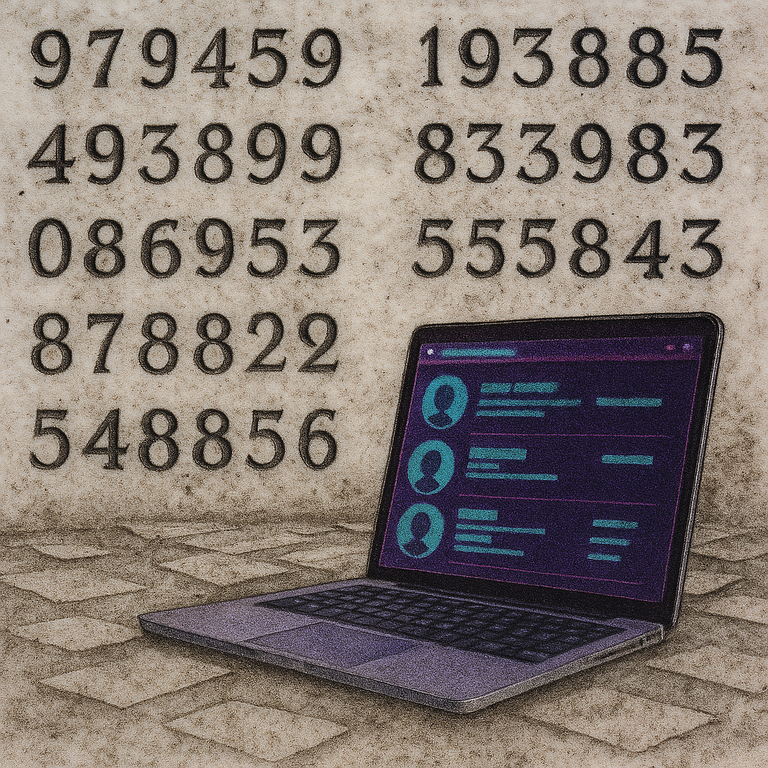
Image created with artificial intelligence, the software used is Microsoft Copilot
Introduction
First, let's try to define what a series is.
A numerical series is an infinite sum of numbers. A numerical series is also defined as the limit of the sequence of partial sums.
Partial Sums
Below I'll try to explain what a partial sum is.
Given the sequence of numbers....
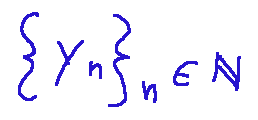
The following quantities are called partial sums.
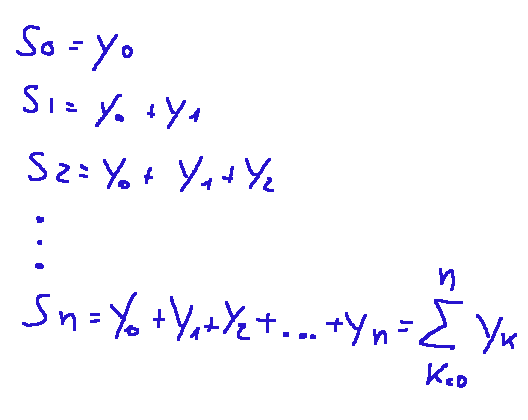
Here is another example of a series:

Convergent Series
I'll now try to explain the concept of a convergent series, first in a technical way, then in a simple way.
Technically, a convergent series is...
Say that a series of the following type...
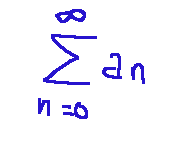
is convergent, meaning that the sequence of its partial sums...

admits a finite limit as N tends to infinity, that is:

WHERE:
S = sum of the series
simply a convergent series is...
In other words, a series is convergent when the infinite accumulation of its terms produces a finite value.
Below I'll try to provide an intuitive explanation that I hope will be helpful if you haven't yet fully understood what a convergent series actually is.
Let's take the following series as an example:

If we continue adding terms to this series, we will obtain an increasingly precise value; the sums S1, S2, S3, etc., get closer and closer to the number 2, but never exceed it.
Why we study the convergence of a series
The convergence of a series is important in mathematical analysis, numerical calculus, probability theory, and physics. In numerical calculus, many constants such as π, or e, and special functions are calculated using convergent series. In physics, the various decay models often reduce to series whose convergence guarantees finite results.
The Cauchy Criterion
Technical Explanation
Augustin-Louis Cauchy, who lived between 1789 and 1857, was one of the masters of mathematical analysis.
Below, I'll try to explain the Cauchy criterion in a complicated way, which is much easier than explaining it simply.
A necessary and sufficient condition for the following numerical series
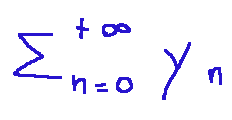
to be convergent is that, for a fixed ε > 0, there exists a...

...such that for n > nε we have continued...

Simple explanation
The Cauchy criterion states that, in complete spaces like 𝑅 (real numbers) or C (complex numbers), convergence does not require knowing the limit; it is sufficient that the partial sums become arbitrarily close to each other beyond a certain point.
Example
Below is the most classic example of a Cauchy series.

Conclusions
Mathematical analysis is certainly a very broad subject, but we have some extremely important pillars. Numerical series represent one of the fundamental pillars of mathematical analysis. Mathematical series allow us to understand how infinite contributions add up to form finite quantities.
Question
Carl Friedrich Gauss was one of the greatest mathematicians in history and also used series in astronomy. Did you know that when he was a child, his teacher, to keep the children quiet, ordered the students to add all the numbers from 1 to 100 and then submit the result. However, Gauss didn't do the sum; he constructed the numerical series that defined the sums and submitted the result almost immediately? For the record, the result is 5050.

ITALIAN

14-07-2025 - Analisi Matematica - Serie numeriche [EN]-[IT]
Con questo post vorrei dare una breve istruzione a riguardo dell’argomento citato in oggetto
(code notes: X-57-56)
Serie numeriche

immagine creata con l’intelligenza artificiale, il software usato è Microsoft Copilot
Introduzione
Prima di tutto proviamo a definire cosa è una serie.
Una serie numerica è una somma infinita di numeri. Una serie numerica viene anche definita come limite della successione delle somme parziali.
Somme parziali
Qui di seguito provo a spiegare cosa è una somma parziale.
Data la successione di numeri....

si chiamano somme parziali le quantità seguenti.

Qui di seguito un altro esempio di serie:

Serie convergente
Provo ora a spiegare il concetto di serie convergente e prima provo a spiegarlo in maniera tecnica, poi in maniera semplice.
tecnicamente una serie convergente è...
Dire che una serie del seguente tipo...

è convergente, significa che la sequenza delle sue somme parziali...

ammette un limite finito quando N tende a infinito, ovvero:

DOVE:
S = somma della serie
semplicemente una serie convergente è...
In altre parole, una serie è convergente quando l'accumulo infinito dei suoi termini produce un valore finito.
Qui di seguito provo a dare una spiegazione intuitiva che spero sia utile se fino a qui non è stato compreso bene cosa in realtà possa essere una serie convergente.
Prendiamo come esempio la seguente serie:

Se a questa serie continuiamo ad aggiungere termini otterremo un valore sempre più preciso, le somme S1, S2, S3,... si avvicinano sempre di più al numero 2, ma non lo superano mai.
Perché si studia la convergenza di una serie
La convergenza di una serie è importante in analisi matematica, nel calcolo numerico, nel calcolo delle probabilità ed in fisica. Nel calcolo numerico molte costanti come π, oppure e, e funzioni speciali si calcolano tramite serie convergenti. In fisica i vari modelli di decadimento spesso si riducono a serie la cui convergenza garantisce risultati finiti.
Il criterio di Cauchy
Spiegazione tecnica
Augustin-Louis Cauchy vissutp tra il 1789 ed il 1857, è stato uno dei maestri dell’analisi matematica.
Qui di seguito provo a spiegare il criterio di Couachy in maniera complicata che è molto più facile che spiegarlo in maniera semplice.
Condizione necessaria e sufficiente affinché la seguente serie numerica

sia convergente è che, fissato ε>0, esista un...

...tale che per n>nε si abbia quanto segue...

Spiegazione semplice
Il criterio di Cauchy afferma che, in spazi completi come 𝑅 (numeri reali) o C (numeri complessi), per avere convergenza non serve conoscere il limite, ma basta che le somme parziali diventino arbitrariamente vicini tra loro oltre un certo punto.
Esempio
Qui di seguito il più classico degli esempi di una serie di Cauchy

Conclusioni
L'analisi matematica è una materia certamente molto ampia, ma abbiamo alcuni pilastri di estrema importanza. Le serie numeriche rappresentano uno dei pilastri fondamentali dell'analisi matematica. Le serie matematiche permettono di comprendere come infiniti contributi si sommano per formare grandezze finite
Domanda
Carl Friedrich Gauss fu uno dei più grandi matematici della storia ed usò le serie anche in astronomia. Lo sapevate che quando era bambino, il suo insegnante, per far tenere tranquilli i bambini della classe, ordinò agli alunni di sommare tutti i numeri da 1 a 100 e poi consegnare il risultato, ma Gauss non fece la somma, costruì la serie numerica che definiva le somme e consegnò il risultato quasi subito? Per la cronaca il risultato è 5050.
THE END



